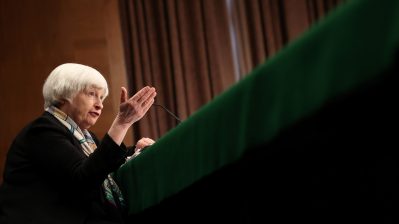Obama’s deficit plan: Politics or policy?
Jeremy Hobson: We are just a half-hour away right now from a big long-term deficit-cutting proposal from President Obama, which is expected to include $1.5 trillion dollars in tax increases — mostly on the wealthy. Also, cuts to Medicare — but not to Social Security. And a trillion dollars in savings by withdrawing troops from Iraq and Afghanistan over the coming decade. Now, top Republicans have already been dismissing much of the president’s proposal.
But let’s talk more now about the economics with Julia Coronado. She is chief economist with the investment bank BNP Paribas, and she’s with us live from New York as she is every Monday. Good morning.
Julia Coronado: Good morning.
Hobson: So Julia, people are already talking about this being more of a campaign 2012 proposal than an actual deficit-cutting proposal. You’re an economist — what are you interested in with this proposal?
Coronado: Well I tend to agree with that take on it. I’m not going to crunch through every detail of the package and think about its implications for the economy because most of it probably won’t get passed. This is sort of an agenda-setting ahead of the 2012 election. Presdient Obama knows very well that most of this probably won’t go through. So it’s really not affecting my outlook for the next 6 to 12 months.
Hobson: Okay, well, I have to say — just a couple of months ago we were in the midst of this big debt ceiling fight, and the downgrade of the U.S. credit rating. It seemed there was a lot of urgency to get something done about the long-term deficit. Is that gone now?
Coronado: Well the urgency then was we absolutely had to pass an increase in the debt ceiling. Now, ironically, the urgency not only has faded, but it’s almost reversed. We’ve got investors so worried about risks to the global economy that the Treasury is having no problems financing itself. In fact, interest rates are hitting record lows. So really, I think the urgency is all about the 2012 political campaign — more self-imposed urgency than something that the market is forcing on the government.
Hobson: Julia Coronado, chief economist with the investment Bank BNP Paribas, thanks as always.
Coronado: My pleasure.
There’s a lot happening in the world. Through it all, Marketplace is here for you.
You rely on Marketplace to break down the world’s events and tell you how it affects you in a fact-based, approachable way. We rely on your financial support to keep making that possible.
Your donation today powers the independent journalism that you rely on. For just $5/month, you can help sustain Marketplace so we can keep reporting on the things that matter to you.


















